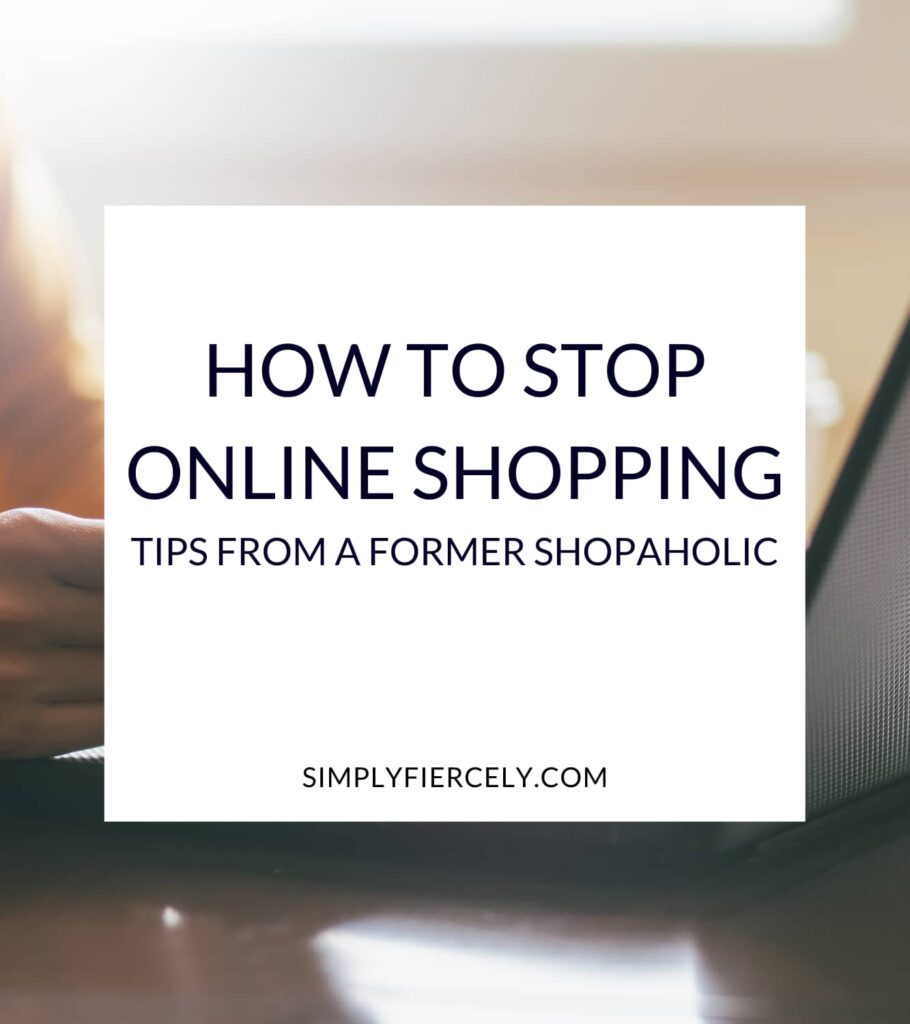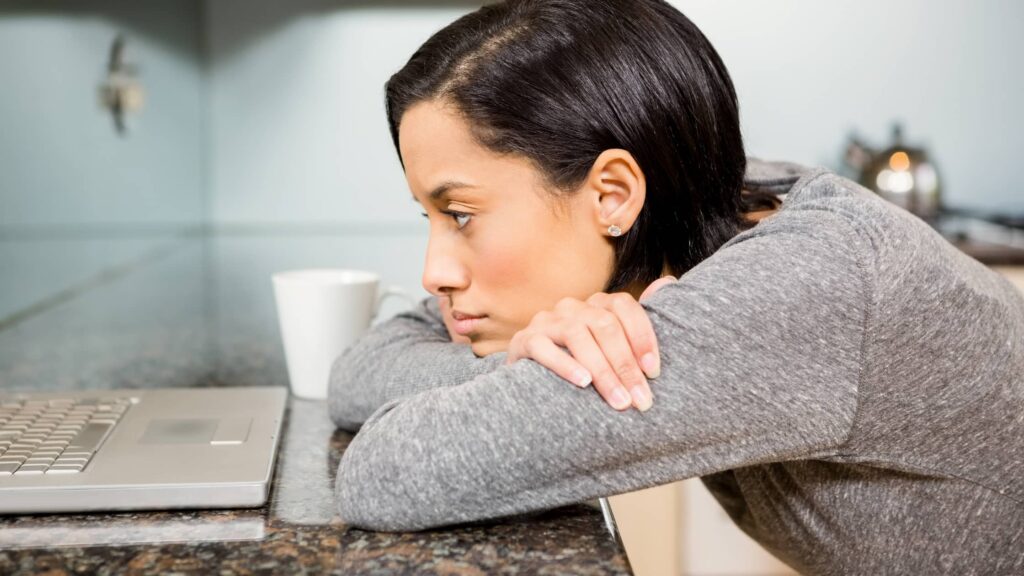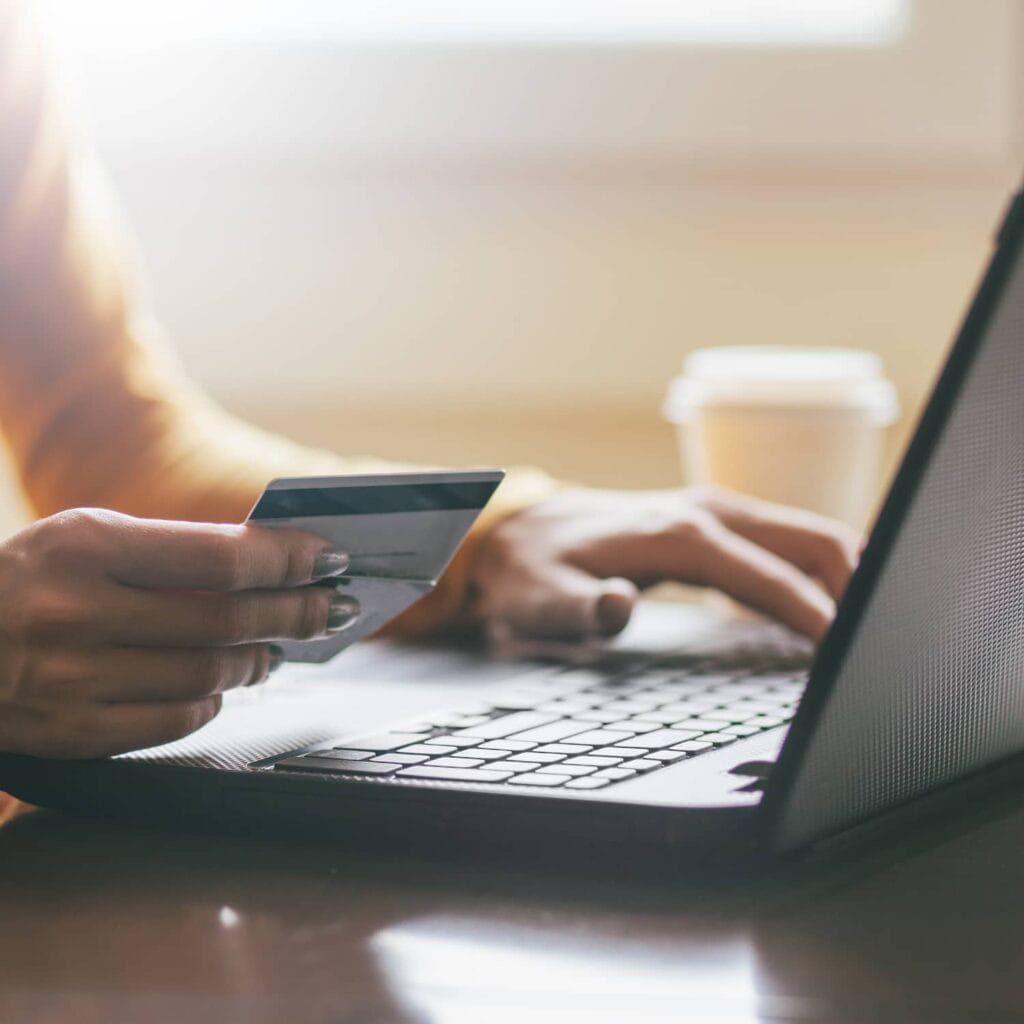Do you need help to stop online shopping? Here are some tips from a reformed shopaholic.
There’s nothing quite like the thrill of shopping, especially online shopping. It’s so quick and easy. Just press “add to cart” and you find instant joy—your brain gets excited, awash with dopamine, and you begin to imagine the many ways this newly-bought thing is going to make your life fuller and richer.
The problem is most purchases rarely fulfil this promise. New things might make you happier for a short time, but the thrill is short-lived more often than not.
Believe me—I’m a reformed shopaholic. I’ve honestly wasted tens of thousands of dollars on clothes that never made it out of my closet. (Ouch!) I know the joy of online shopping … and I also know what can happen in the aftermath: debt, shame, and regret.
Even if you don’t identify as a shopaholic, I’m sure you’ve experienced the ping of buyers remorse. We buy things we don’t really need with money that we don’t really have (or at least, money that could be better spent elsewhere).
If any of this hits a bit close to home, then keep reading for tips that will help you stop shopping. These have all been real-world tested in my own life and—as someone who once impulsively spent $700 buying secondhand shoes on eBay—I know they work.

How To Stop Shopping Online
Inspect Your Urges
First and foremost, it’s helpful to know that most of the time, shopping is psychological. We don’t really need all the things we buy. Instead, we make purchases because it makes us instantly happy (remember the dopamine?).
And over the past 25 years, more and more of us have been turning to online shopping to satisfy this urge. It was 1994 when the first documented online purchase was made, and since then, the e-commerce industry has grown like a five-headed monster. And in 2020, total sales globally have tripled, reaching $4.2 trillion!
It feels somewhat soothing that others shop a lot too, right? But that’s actually part of the problem. We think excessive shopping is normal because everyone else is doing it when, in reality, there are just a LOT of people buffering their emotions with stuff.
Because honestly, that’s what shopping is for many people. It’s less about what you want to buy and more about managing your feelings. We feel the urge to shop when we’re:
- Sad
- Triggered by something
- Angry
- Anxious
- Bored
Buying something new is a way of distracting ourselves from uncomfortable feelings, and online shopping only amplifies this problem. Technology means we can make instant purchases and instantly self-soothe.
You don’t have to wait for stores to open and there’s no drive to the shops, which means there’s no time or space to move through our emotions. Instead, we can avoid them altogether. It’s habit-forming and it’s why you can’t stop online shopping, even if you want to.
The solution—or at least, the first step forward—is to pay attention to what triggers your urge to shop. Are you comparing yourself to people you see online? Do you shop because it makes you feel better about yourself? Do you sometimes feel unloved and shop after a fight with your family or friends to ease the stress?
If so, don’t judge yourself. Instead, simply observe and practice self-compassion. Try writing down these trigger points on a sticky note and placing it somewhere where you can see them.
Next time when you’re feeling triggered by any of these emotions, remove yourself from any shopping devices and hide away your credit cards. Why not try practising self-care or journaling instead.

Delete Shopping Apps
Working on your shopping triggers is one of the best ways of changing your habits, but the urge won’t disappear overnight. In the meantime, there are practical things you can do to stop online shopping.
Because let’s be honest: modern technology has made it really difficult to resist!
Have you ever been scrolling through Instagram or the ASOS app on the way to work and suddenly, you’ve made a purchase that you absolutely didn’t need? Or have you ever seen a social media influencer wear something extraordinary that you felt you couldn’t live without? Within seconds, that beautiful item has been bought, paid for, and it’s on its way.
But we can be smarter than the apps that make us buy more stuff. An easy way out? Delete them from your phone altogether. This way, you’ll have to make a conscious decision to sit down to the computer to buy something online. It is less convenient, thus makes it easier for you to control your shopping habits.
In addition to deleting apps, you can also unsubscribe from emails, stop following brands and influencers on social media, and stop reading fashion blogs or online magazines. These small choices can really help you stop shopping online.
Forget Your E-Wallet
Convenience makes us easy prey to guilty pleasures. Since our devices conveniently ‘store’ the passwords to our payment platforms and credit cards, buying anything in the world (except for yachts or apartments) is literally a click or two away.
A good idea is to “forget” your credit card details online. This can be as easy as clearing your cookies and cache often, or you might need to remove your saved credit cards from your browser.
I know it’s inconvenient, but that’s the point. Sometimes the hassle of having to physically get your credit card is enough resistance to slow your online shopping habits!

Create a “Wait and See” List
It’s a familiar scenario: you’re going about your daily life when suddenly, you realise you need something. You pick up your phone to place an Amazon order, right?
If so, try making this one small change to your routine. Instead of going on Amazon, open a notepad app and start a “Wait and See” list. (If you usually do your online shopping at a computer, create a list there instead.) Write down everything you want to buy—and then wait.
This list is helpful in several ways. First, writing things down slows the purchasing process and, as we’ve already discussed, slowing down gives you time to process your feelings. Do you really need this? Or are you reacting to something? You might find that after a few days, you no longer feel the desire to buy.
Another way this list helps is by creating awareness of how much you want to shop. Track your urges for a few weeks, and the results might surprise you! Try adding up all the money you would have spent but didn’t. It might be an eye-opener.
Related Post: How to Stop Buying Clothes You Never Wear
The Truth About Online Shopping
Admittedly, with everything going on in the world right now, most of us are shopping online more than ever. I spent a good chunk of last year at home with a baby and a toddler, and I know it’s hard. I also made more online purchases than usual too, and that’s OK. I’m giving myself grace and you should too.
I’m also grateful that online shopping exists right now. I know it’s a life-saver for a lot of people who are in a difficult position. But at the same time, you must be mindful of your habits. If you catch yourself thinking “I need to stop online shopping” then take a deep breath, and commit to making a change.
Becoming more intentional with our spending is one of the most powerful ways we can create freedom in our lives—and isn’t that what we all want? More money, more time, and more space for the things and people that matter most. The more you remember this, the easier it will be to walk away next time you feel the urge to “add to cart”.
Have you ever felt like you can’t stop shopping online? What helped you get your habit under control? Let us know in the comments!


I as well, am a shopaholic….I just decluttered my closet in a major way…7 HUGE garbage bags, but still have ordered a few things. I AM slowing down the ‘getting stuff’ and I also realize I am using shopping as ‘self reward’ after surviving narcissistic abuse from father and X to the tune of 75 yrs. I have remodeled/redecorated my home, l travel First Class, REWARDING myself. But, I need to calm down now because I AM SAFE. Thank you for nailing this addiction. And part of the problem is, I can afford to behave this way.
I hope I have learned my lesson. The last couple of months I gave thousands of dollars worth of NWT and NIB clothing, shoes, boots and handbags. I sold several things online and a couple of items at a local consignment shop.
The biggest takeaway was how easily I gave up my money and how much work it was to try and get a small amount of money for my clothing. What a waste.
For example: LK Bennett classic Osten trench coat NWT’s orig. price $495.00 and it would not sell online for my asking price of $51.00. I removed the listing and gave it to my neighbor.
I purchased a new trench coat this week $430 on final sale $161. It is the ugliest coat I have ever seen. I donated the coat within hours. I tried to return for a store credit but didn’t have any luck.
I started buying online because it gave me access to brands I could not buy in my area. The problem is final sale items are the worst. The items look like a deal, but often the merchant that got red of the item was the only one who won.
I was doing better by making thoughtful purchases on items I could return and ended up making this ugly trench coat purchase.
Thank you for all your good tips. I believe my problem is related to having chronic pain. I buy items for the life I hope to have when I feel better (if that ever comes). My own closet needs to be my new place to shop.
My best to all.
So glad I found this article. I am dealing with my father going thru dementia. We spend so much on him every month that I feel buying myself a lot of something’s to help me. Will help.
But, it doesn’t.
I have been asking for help from the gov. But I get nothing. Trying to navigate this has been the single most anxiety and depressing thing I have ever had to do. After 9 years it still isn’t over.
I am at least trying to find solutions to the things I know I can control. I have bought thousands of dollars on any book claiming it can help you navigate dementia. Yet, I still feel horribly empty inside.
My father is turning 80 next year and he doesn’t know who I am. Not to mention my family isn’t supportive in anyway. So I had to move away to try and sell his house to pay for his care.
Using the excuse of making my home a sanctuary I have spent over 30k in gadgets and little expensive things to make my new home beautiful.
My husband tells me it’s worth it and I should not be so hard on myself. I know but, I spend too much, Amazon is amazing.
So this is a very open approach to taking a first step.
So thank you for writing this so I could find it.
Much appreciated,
I didn’t realize I was “shopaholic” until I was cleaning out my basement to move. I had so many clothes with with the tags still on. Many of them were nothing I would buy now. Starting loading them up for Goodwill. I’m doing better but still have check to see what shopping channels are selling. Now I put an item in the cart and most time don’t buy it. If I do purchase it and regret it now I do send it back. The return shipping charges are expensive but better than buying something I don’t need. Hopefully after my move I’ll be less anxious and can get it completely under control.
This is a well written article. Very to the point! What has helped me is I have a monthly budget. During the month I may find items I want(clothing) then I will put them in my cart on-line. I will check the cart(or carts) whenever I feel like shopping but NOT buy anything. As the month goes on I remove what I feel I can live without. By the end of the month I buy some items but I NEVER spend over my budget. I’m learning there are other items I want more then clothing and buying more of those items. For example, I’m back to doing art so art supplies. I’m also a big reader so books come onto my list. I go shopping now to complete outfits and I shop with a list!! Sooo much better!!!
Thank you for these empowering suggestions and reminders.
Emotional awareness is so important when marketing is designed to be triggering and to bypass the thought pause.
Be purposeful. Proceed intentionally. Save money.
❤️🙂
This was a great blog post, I’ve read these strategies before but it’s good to have a reminder. The knowledge that it’s feelings driving our actions (in this case, online shopping, driven perhaps by feelings of boredom or loneliness) is really important in order to understand and break the habit.
As a mum of three little kids, and starting my own business, and having moved house a week ago, I have a lot on my plate. I notice that when I go online to browse shops, it is driven by a feeling that I have neglected my needs. I have learnt to see it as a warning sign. So when I find myself browsing for clothes online, sometimes (not always, as I am still practicing!) I ask myself: What do I really need right now, for me? Do I need to journal? Do I need to go outside for a little walk? Do I need a cry? Do I need to connect with a friend (online as we’re in a pandemic)? I really like seeing the urge to online shop and the action of browsing as a warning sign like this. A helpful one. Rather than judging it as a bad thing. Maybe this can help others too 😉
This is timely for me and thanks for sharing. I was doing really well with hardly buying anything online lately (after buying hundreds of things over 6 years) and then over the last two weeks I have ordered 8 pairs of shoes. That’s more than some people actually own! How crazy! But I do feel I am doing better than I was. My trouble is impulse buying. I click the button and then go, oh well, too late. I am trying to draw the line under it today.
One of the things that drives me crazy are the ads that “follow” me around on Facebook and other media websites after I’ve looked at an item or visited an online store. Getting rid of the ads is almost impossible so I occasionally try a novel tactic—-I intentionally look up products that I don’t have the slightest interest in buying. A fancy power tool, for example. A canoe. Horse supplies. Whatever, as long as it’s an item that is irrelevant to my life. That way, at least some of the ads that pop up in my feeds aren’t the least bit tempting!
Nice! I will have to try that.
I agree with what Aylisha said above. I also find myself rationalizing purchases (using reward points, buying second-hand, etc) to convince myself that I’m saving money. But in the end, I save the most by limiting my time online. Thanks for the tips!
This is very timely for me! Thank you so much for posting this. These are great tips, and I so much appreciate the honest but not judgy attitude with which you approach it!
Thanks for the great tips. I seem to shop online to buy gifts for people to receive gratitude and attention which makes me feel important and generous. Will try to do better…..